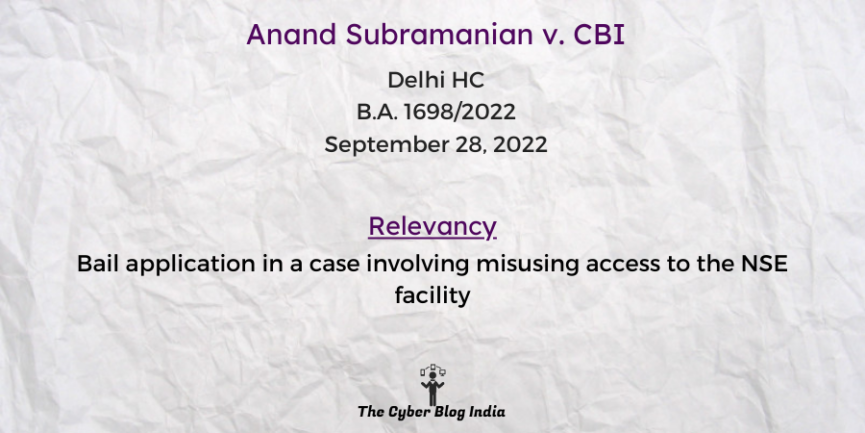Anand Subramanian v. CBI

Anand Subramanian v. Central Bureau of Investigation
In the High Court of Delhi
B.A. 1698/2022
Before Justice Sudhir Kumar Jain
Decided on September 28, 2022
Relevancy of the case: Bail application in a case involving misusing access to the NSE facility
Statutes and Provisions Involved
- The Information Technology Act, 2000 (Section 66)
- The Indian Penal Code, 1860 (Sections 7, 12, 13(2), 120B, 204)
- The Code of Criminal Procedure, 1973 (Sections 167(2), 173(2), 439)
- The Prevention of Corruption Act, 1988 (Section 13(1)(d))
Relevant Facts of the Case
- The petitioner has applied for bail in a CBI case involving OPG Securities’ misuse of the National Stock Exchange (NSE) co-access facility.
- OPG Securities was a broker entity that gained unfair access to the NSE’s backup channel with less broker traffic. By colluding with unnamed NSE officials, they gained better access to the market and profited from this conspiracy.
- The petitioner is also accused in another investigation regarding his appointment as Chief Strategic Advisor (CSA) by the Joint Managing Director (co-accused). The investigation alleges his appointment was unfair. He was later promoted to “Group Operating Officer” and “Advisor to MD”.
- In that case, the allegations further state the petitioner and the Joint Managing Director conspired to appoint him and grant him undue monetary gains. SEBI fined the petitioner after investigating the case, and he has been disassociated from NSE since 2016.
- Though not named as an accused in the current CBI FIR, the petitioneris in police custody. The CBI has not yet submitted a final report. The Special Court and the High Court have rejected his previous bail applications.
Prominent Arguments by the Advocates
The petitioner’s counsel:
- The offences are not heinous. Moreover, there is no prima facie case that could result from the CBI’s FIR.
- Moreover, the CBI has completed custodial interrogation; hence, additional detention is unnecessary.
- There is no chance of him tampering with the evidence or influencing the witnesses.
The respondent’s counsel:
- The charges against the petitioner were serious, encompassing corruption and misconduct. If released on bail, he might tamper with evidence and manipulate witnesses, thus hindering investigation.
- He has myriads of resources available that could facilitate absconding.
Opinion of the Bench
- The court explored the scope for granting bail under Sections 167(2) and 173(2) of the Code of Criminal Procedure, 1973. Section 173 only permits rejection based on a final report by the investigation agency.
- The CBI has missed the deadline to submit its final report within 60 days. Because of this, the petitioner has the right to bail under Section 167(2), if not regular bail under Section 439.
Final Decision
- The bench allowed the bail application with conditions.
Nandita Karan Yadav, an undergraduate student at the National Law Institute University, Bhopal, and Prachi Chakravarty, an undergraduate student at University Law College, Bangalore University, prepared this case summary during their internship with The Cyber Blog India in May/June 2024.
